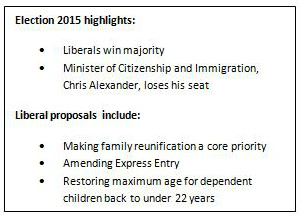Changes to Canadian Immigration Likely After Liberals Win Election
 Plans to modify family reunification, economic immigration and refugee settlement expected to be made by Trudeau-led government
Plans to modify family reunification, economic immigration and refugee settlement expected to be made by Trudeau-led government
In a stunning victory, the Liberal Party of Canada has toppled the Conservatives in the Canadian federal election, held on October 19. The Liberals, led by Justin Trudeau, son of former Prime Minister Pierre Elliott Trudeau, won with a promise of change. Over the course of the election campaign, it was made clear that much of that change will be focused on the immigration file.
Canada will have a new government, a new Prime Minister, and a new Minister of Citizenship and Immigration.
More importantly, it also appears that the country will be governed by a government that believes strongly in the economic and societal benefits of immigration of Canada. Historically, the Liberal Party has overseen some of the most fundamental and long-standing reforms in Canadian immigration policy, including the introduction of the first points system in 1967. Prior to that, Liberal Prime Minister Wilfrid Laurier — who Trudeau quotes frequently — governed during a time when Canada welcomed the largest number of new immigrants in its history.
 The Liberal platform includes a number of proposals that would likely increase the overall number of new permanent residents in Canada. Many potential applicants, however, have noted that eligibility requirements may change, and nobody can be sure of when that may happen.
The Liberal platform includes a number of proposals that would likely increase the overall number of new permanent residents in Canada. Many potential applicants, however, have noted that eligibility requirements may change, and nobody can be sure of when that may happen.
Family Reunification
Throughout the campaign, the Liberals pledged to make family reunification a more open and quicker process. The Liberal platform includes measures to:
- Nearly double the budget for family class immigration processing in order to reduce processing times.
- Double the application intake cap for the Parent and Grandparent Program, from 5,000 to 10,000.
- Remove the ‘conditional’ stipulation from the permanent resident status of spouses, common-law or conjugal partners in a relationship of two years or less with their sponsor and who have no children in common with their sponsor at the time they submit their sponsorship application, as is currently the case.
- Restore the maximum age for dependents back to under 22, instead of under 19.
Express Entry
The Express Entry immigration selection system, which came into operation on January 1, 2015, was the key change in economic immigration made by the previous government. It moved Canada from a supply-driven (or first-come first-served) economic immigration model to a demand-driven (or ‘Expression of Interest’) system, with a strong focus on employment in Canada and the involvement of the private sector.
Rather than doing away with Express Entry, the Liberals have pledged to conduct a review of the system. The Liberal Party platform proposes that candidates with siblings in Canada should be granted additional points under the Express Entry system. Under the Liberals, elements of family reunification may seep into economic immigration policy.
Temporary Work Permits
The number of temporary work permits issued over the past decade has increased substantially from previous levels. The Liberal party has proposed reform of the Temporary Foreign Worker Program (TFWP), while emphasizing that the government should focus on permanent immigration.
Last month, Liberal leader Justin Trudeau reiterated that his party would implement a five-point plan to change the TFWP. If implemented, the measures would:
- establish a mandatory complaint tracking system;
- ensure compulsory and regular workplace audits;
- require mandatory disclosure of investigations into abuses of the program;
- require mandatory disclosure of federal employer compliance reviews; and
- establish a monthly disclosure regime that indicates the number of temporary foreign workers in Canada by (i) region, (ii) National Occupation Classification code, (iii) employer.
Canadian Citizenship
The previous government of Canada made a number of changes to requirements for individuals seeking naturalized Canadian citizenship, with opposition parties, as well as a large section of the Canadian public and potential applicants alike, vocally opposed to those changes.
Since the changes came into force in June, 2015, the physical residency requirement before an application may be made was increased to four years from three. In addition, time spent in Canada on a work or study permit is no longer counted. The Liberals have pledged to restore the residency time credit for foreign students and other temporary residents applying to become Canadian citizens.
Furthermore, the Liberals have stated their intention to Repeal bill C-24, also known as the Strengthening Canadian Citizenship Act. Among other measures, this legislation allows the government, through the Minister of Citizenship and Immigration, to strip dual citizens (as well as those who may qualify for citizenship of another country) of their citizenship in certain cases.
Canadian immigration, present and future
“After nearly a decade of Conservative government, Canada has opted to restore the Liberal Party to office. Throughout the history of Canada, various Liberal governments have had the vision and determination to grow the country — and now is a wonderful opportunity to do so again,” says Attorney David Cohen.
“How exactly the new government may accomplish that remains to be seen, but they have given us a fair idea of changes that might be expected. While the overall number of economic immigrants may increase, family reunification is likely to become a core priority. This is good news for Canadian citizens and permanent residents who have become frustrated by burdensome requirements, a perceived lack of transparency, processing times that have increased year-on-year, and small application intake caps.
“For individuals who are currently eligible for an economic immigration program, I would strongly encourage pursuing permanent residence as soon as possible. The Liberals have stated that they are looking to make changes to the Express Entry system, but those changes have not yet been defined. While some candidates’ points may increase as a result of any changes, others may see a decrease or stagnation, reducing the competitiveness of their profile. Indeed, eligibility requirements to even enter the pool could be changed if the federal economic programs are changed. Therefore, it is now hugely important for individuals who are eligible to enter the pool to do so before the new government can draft new regulations and implement them.”
To find out if you are eligible for any of over 60 Canadian immigration programs, please fill out a free online assessment today.
© 2015 CICnews All Rights Reserved
- Do you need Canadian immigration assistance? Contact the Contact Cohen Immigration Law firm by completing our form
- Send us your feedback or your non-legal assistance questions by emailing us at media@canadavisa.com



